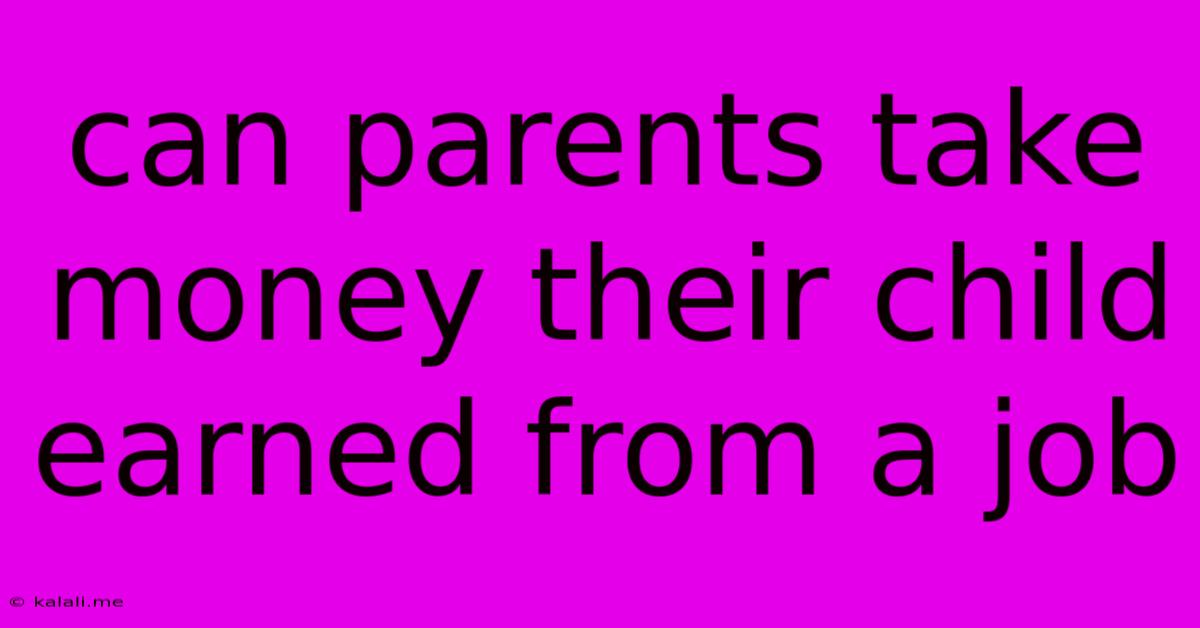Can Parents Take Money Their Child Earned From A Job
Kalali
Jun 04, 2025 · 3 min read

Table of Contents
Can Parents Take Money Their Child Earned From a Job? A Guide to Child Labor Laws and Financial Responsibility
This article explores the complex question of whether parents can legally take money their child earned from a job. The answer, unfortunately, isn't a simple yes or no. It depends on several factors, including the child's age, the nature of the work, and the applicable state and federal laws. This guide will help you understand the legal and ethical considerations surrounding a child's earnings and parental access to those funds.
Understanding Child Labor Laws
Before diving into parental access to a child's earnings, it's crucial to understand the basics of child labor laws. These laws vary by state and country, but generally aim to protect children from exploitation and ensure their safety and well-being. They often dictate minimum ages for employment, permissible hours of work, and types of jobs suitable for minors. Failing to comply with these laws can result in significant penalties for employers and, potentially, parents.
The Role of Parental Consent and Guardianship
Children under the age of 18 are generally considered minors, meaning they lack the legal capacity to enter into contracts independently. This includes employment contracts. Parental consent is usually required for a minor to work legally. This consent often implies that the parent or guardian has a degree of responsibility for the child's welfare, including the management of their finances.
Parental Rights vs. a Child's Financial Autonomy
Even with parental consent for employment, the question of access to the child's earnings remains nuanced. While parents have a legal and moral obligation to provide for their children's needs, this doesn't automatically grant them the right to seize their child's income. As children mature, the concept of financial autonomy becomes increasingly relevant. A teenager earning money from a part-time job might reasonably expect to have some control over how that money is spent.
Factors Determining Parental Access to a Child's Earnings
Several factors influence whether parents can legitimately access a child's earned income:
- The Child's Age: Younger children, particularly those who are significantly underage for employment, generally have less financial autonomy. Parents might have a stronger claim to manage their earnings for necessities.
- The Purpose of the Earnings: If the child's earnings are clearly designated for specific needs, such as education, college fund, or personal savings, parents should respect this intention. Using the money for other purposes could be considered misappropriation.
- The Child's Maturity Level: A mature teenager demonstrating financial responsibility might reasonably expect greater control over their earnings. A parent taking their money without consent could damage their relationship and trust.
- State and Local Laws: Some jurisdictions have specific regulations concerning minors' finances, providing guidelines on parental access or requiring court intervention in certain circumstances.
- Court Orders: In cases of divorce or separation, court orders might specify how a child's earnings should be managed.
Ethical Considerations
Beyond the legal aspects, ethical considerations are crucial. Parents should prioritize open communication and teach their children about financial responsibility. Taking a child's hard-earned money without their consent or a clear understanding can be damaging to their trust and self-esteem. It's essential to foster a collaborative approach to managing finances, teaching financial literacy, and encouraging responsible spending habits.
Conclusion
The legality and ethics of parents taking their child's earned money are intricate and depend on multiple factors. While parents have responsibilities for their children's well-being, taking their income without their consent and for reasons unrelated to their needs is generally inadvisable. Open communication, respect for the child's autonomy (as appropriate to their age and maturity), and adherence to child labor laws are essential. When in doubt, seeking legal counsel is always recommended.
Latest Posts
Latest Posts
-
How To Make An Automatic Door In Minecraft
Jun 06, 2025
-
When To Use Conditional Vs Subjunctive
Jun 06, 2025
-
How To Filter Chlorine Out Of Tap Water
Jun 06, 2025
-
A Mistake In A Movie That Doesnt Match The Time
Jun 06, 2025
-
Meaning Of Names Of Cain Enoch Irad And So On
Jun 06, 2025
Related Post
Thank you for visiting our website which covers about Can Parents Take Money Their Child Earned From A Job . We hope the information provided has been useful to you. Feel free to contact us if you have any questions or need further assistance. See you next time and don't miss to bookmark.